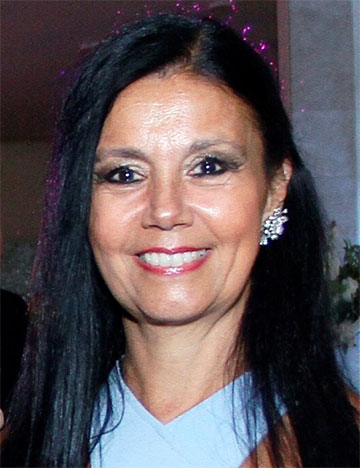
Luciana Kassab
In this installment of senior member insights, OPN talks with Luciana Kassab, a full professor of physics at the Faculdade de Tecnologia de São Paulo/Centro Estadual de Educação Tecnológica Paula Souza since 1992. Kassab received her Ph.D. in physics in 1996 at the University of São Paulo. She has 30 years of research and teaching experience, leading pioneering work in glass photonics and novel nanocomposites for technological applications, including integrated optics photonic systems, solid-state laser and photovoltaic devices, and radiation shielding, based on GeO2 and TeO2.
Kassab’s current research interests include plasmon-assisted efficiency enhancement of rare-earth doped glasses covered solar cells, new fabrication processes of pedestal waveguides for optical amplification in the short-wave-infrared region, plasmonic effects on the optical gain of rare-earth doped waveguides, metallic nanocluster production in glasses based on heavy metal oxides, and graphene production using the sputtering technique.
Kassab was the Director of the Faculdade de Tecnologia de São Paulo from 2006 to 2017. She is a member of Optica, the Brazilian Physical Society, the Brazilian Society of Photonics, the Brazilian Materials Research Society, and the National Institute of Photonics/National Council for Scientific and Technological Development. She has also been reviewing research proposals for Brazilian financial agencies. Kassab was one of the first Brazilian researchers to publish a paper in Optics Express (Opt. Express, doi: 10.1364/OE.6.000104) when the journal was created. She has also organized several symposia for Brazilian Materials Research Society annual meetings along with collaborators.
What first interested you in pursuing science?
My first physics classes when I was fourteen years old interested me in pursuing science.
What aspect of your current work do you find the most interesting or exciting?
Dealing with experiments and their exciting results regarding the technological applications that can be reached is the aspect of my current work that motivates me.
What tips for successful networking do you have for early-career professionals?
For successful networking for early-career professionals, it is important to participate in scientific and technical conferences and workshops, to put important results in the media and always report the relevant results in scientific journals, meetings, conferences and workshops.
What professional resources do you rely on to stay active and engaged with your field?
I think that all resources are important to stay active and engaged in my field: professional conferences, networking events and webinars. It is also important to find a way to share ideas and discuss with scientists from different countries.
What skills do you think are most important for someone interested in a career like yours?
It is important to study, keep up to date, be dedicated, persevere and never give up: the words “no way out” do not exist. Moreover, love is also important: when we love what we do, it is easier to overcome barriers.
What’s the best career decision you’ve ever made, and why?
My decision to be a teacher and researcher was made when I was young; I do not regret it. Knowledge is something that cannot be kept and has to be disclosed: it does not make sense to study a lot but not teach the young and motivate them. Moreover, my mother was a teacher and inspired me, too. We cannot forget that education is the basis for the development of a country.
What advice do you have for young scientists who are discouraged about their current work or career path?
For those that are discouraged about their current work or career path, I would recommend not giving up and continuing to try because, as I said before, when we love what we do, it’s easier to deal with adversities. Let’s be positive, as this helps a lot … Sometimes, it is important to see if it is necessary to change the research field or simply let time solve the problems.
What is one piece of advice that you wish you were given as a student/early in your career?
To be honest, I received from my father, who was a lawyer, the most important advice: do what you love in order to feel accomplished in the future.
What habits do you frequently rely on that help you to succeed?
The habits I frequently rely on to help me succeed are walks and hydrogymnastics, which help me relax and inspire me. Of course, whenever necessary, I ask for help. I do not use organizational apps: I try to memorize everything as much as I can.
If you weren’t in the sciences, what would be your dream career?
Although I love music and different languages, I never thought of doing something that wasn’t science.
